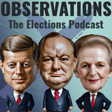
Electoral Reform: Should 16-Year-Olds Vote?
In this special episode, host Lily Russell-Jones explores one of the government's most controversial electoral reforms: lowering the voting age to 16. With Scotland and Wales already allowing younger voters in some elections, is this a positive step for democracy or a risky experiment?
Eddie Barnes from the John Smith Centre at Glasgow University shares polling that reveals young people themselves are divided—48% support getting the vote, but 32% disagree and 20% aren't sure. The most common word 16-year-olds use to describe politics? "Confusing." Two-thirds say they don't feel prepared by schools to vote, and three-quarters of those unlikely to vote cite not knowing enough about politics as their reason.
Psychologist Dr. Lynette Thompson explains the neuroscience: while 16-year-olds are cognitively capable of voting and there's little biological difference between 16 and 18, the adolescent brain's prefrontal cortex won't fully develop until the mid-20s. She distinguishes between "hot cognition" (impulsive decisions) and "cold cognition" (considered decisions like voting), but warns about social pressure, identity formation, and how 16-year-olds struggle more with fake news and are more influenced by peer pressure when forming political opinions.
Finally, 17-year-old Alex Nurton from the UK Youth Parliament argues passionately that young people deserve a voice on issues like climate change that will affect their future far more than older voters. He calls for mandatory political education across the UK, pointing out that nothing fundamentally changes when you turn 18—yet policies consistently ignore 16 and 17-year-olds.
From brain development to ballot boxes, this episode examines whether giving young people the vote will strengthen democracy or whether we're asking them to make decisions they're not yet equipped for.
